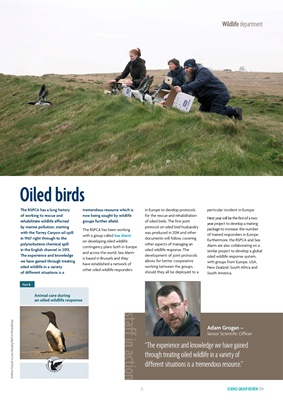
23 SCIENCE GROUP REVIEW 2014
Wildlife department
The RSPCA has a long history
of working to rescue and
rehabilitate wildlife affected
by marine pollution, starting
with the Torrey Canyon oil spill
in 1967 right through to the
polyisobutene chemical spill
in the English channel in 2013.
The experience and knowledge
we have gained through treating
oiled wildlife in a variety
of different situations is a
tremendous resource which is
now being sought by wildlife
groups further afield.
The RSPCA has been working
with a group called Sea Alarm
on developing oiled wildlife
contingency plans both in Europe
and across the world. Sea Alarm
is based in Brussels and they
have established a network of
other oiled wildlife responders
in Europe to develop protocols
for the rescue and rehabilitation
of oiled birds. The first joint
protocol on oiled bird husbandry
was produced in 2014 and other
documents will follow, covering
other aspects of managing an
oiled wildlife response. The
development of joint protocols
allows for better cooperative
working between the groups,
should they all be deployed to a
particular incident in Europe.
Next year will be the first of a two
year project to develop a training
package to increase the number
of trained responders in Europe.
Furthermore, the RSPCA and Sea
Alarm are also collaborating on a
similar project to develop a global
oiled wildlife response system,
with groups from Europe, USA,
New Zealand, South Africa and
South America.
Oiled birds
Adam Grogan -
Senior Scientific Officer
"The experience and knowledge we have gained
through treating oiled wildlife in a variety of
different situations is a tremendous resource."
staff in action
Andrew Forsyth x2, Joe Murphy/RSPCA Photolibrary